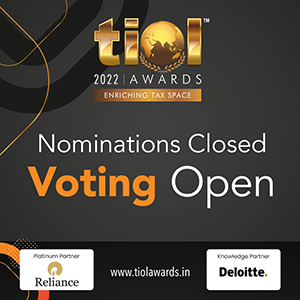2022-TIOL-1007-HC-DEL-CUS
Acme Heergarh Powertech Pvt Ltd Vs CBIC
Cus - The grievance of petitioner is that the circular dated 09.07.2022, in a sense, directs the concerned authority to revoke two licenses issued by respondent under Manufacture and Other Operations in Warehouse (no.2) Regulations, 2019 - This circular appears to dialate on the manner in which section 65 of Customs Act, 1962 and 2019 Regulations are to be applied - Petitioner has set up a prima facie case - Balance of convenience also appears to be in favour of petitioner, since the petitioner has operated under scheme captured in 2019 Regulations and up until now, has obtained deferral of customs duty and IGST - Coercive measures, if any, taken by respondents, at this juncture, when petitioner's import consignment is due to arrive in country, will cause detriment to petitioner's interest: HC
- Matter listed: DELHI HIGH COURT
2022-TIOL-1006-HC-DEL-ST
Ambience Commercial Developers Pvt Ltd Vs UoI
ST - The petition is directed against statement issued by Designated Committee in prescribed form i.e. SVLDRS-3 and the order dated 23.01.2020, whereby petitioner's rectification application preferred under Section 128 of FA, 2019 was rejected - According to petitioner, total demand raised for period in issue was Rs. 16,61,78,084/- - Against this amount, it is submitted that petitioner would be entitled to a rebate of 50% under Sabka Vishwas (Legacy Dispute Resolution) Scheme, 2019, which would peg the amount payable at Rs.8,30,89,042/- - Petitioner contends that Rs. 6,39,36,641/- having been paid, it should be called upon to pay towards tax, under extant scheme, remaining amount equivalent to Rs.1,91,52,401/- - On the other hand, revenue contend that the petitioner ought to have paid Rs. 5,95,38,784/-, as was indicated by them while seeking to avail of benefit of the Scheme - The Designated Committee cannot go beyond either the counters of SCN or the operative directions contained in O-I-O - Perusal of directions would show that the demand is pegged at Rs. 16,61,78,084/- which is evident on a bare perusal of clause (a) of operative directions - Insofar as clause (b) is concerned, it simply says that CENVAT credit amounting to Rs. 8,07,72,766/- which was wrongly availed and utilised against payment of service tax liability, is disallowed and in that behalf Rule 14 of CCR, 2004 has been invoked - The intrinsic evidence, which is available indicates that this amount i.e., the CENVAT credit which has been disallowed, is embedded in demand of Rs. 16,61,78,084/- - What the revenue dispute is, that the demand cannot be limited to Rs. 16,61,78,084/-, as the amount which was disallowed by way of CENVAT credit i.e., Rs. 8,07,72,766/-, had to be added to the same - It is not in dispute that the petitioner has already deposited Rs.1,91,52,401/- - The Designated Committee is directed to issue a fresh statement in prescribed form, having regard to what is stated herein: HC
- Writ petition allowed: DELHI HIGH COURT
2022-TIOL-1005-HC-KOL-CX
CST Vs Surya Vistacom Pvt Ltd
CX - Whether the Tribunal is right and justified in setting aside the demand of duty when assessee in spite of providing both taxable and exempted service held to maintain separate account as required under Rule 6(2) of Cenvat Credit Rules and also failed to exercise option as stipulated under Rule 6(3) of CCR, 2004 - In the decision of Supreme Court in Uniworth Textiles Ltd. 2013-TIOL-13-SC-CUS , the Supreme Court held that every non-payment/non-levy of duty does not attract extended period and there must be deliberate default - Further, it was held that the conclusion that mere non-payment of duties is not equivalent to collusion or wilful misstatement or suppression of fact is untenable as the Act contemplates a positive action which betrays a negative intent of wilful default - Further, in Pushpam Pharmaceuticals Co. 2002-TIOL-235-SC-CX it was held that misstatement or suppression of fact must be wilful since the word 'wilful' precedes the words 'misstatement or suppression of fact' which means with an intent to evade duty - There is no specific allegation or prima facie finding of any wilful misstatement or suppression on the part of assessee - That apart, details have been culled out by adjudicating authority from available records and there is no new or fresh tangible materials available in hands of adjudicating authority to make out a case of wilful misstatement or wilful suppression - Therefore, Tribunal was fully justified in holding that extended period of limitation could not have been invoked - As regards to issue as to whether the adjudicating authority could have mechanically applied 6% rule on assessee, if according to adjudicating authority, assessee did not abide by provisions of Rule 6(3) of Rules, it was open to adjudicating authority to reject assessee's claim as regards disputed Cenvat Credit and it could not mechanically invoke 6% Rule on assessee - That apart, the Tribunal also noted that the department mechanically applied 6% of entire balance-sheet turn over of assessee without detailing as to why the said turn over has been taken and why not the value of trading that is provided in Rules, namely, the difference between the sale price and the cost of goods sold or 10% of the cost of goods sold whichever is more in terms of Explanation-1 as contained in Rule 6(3A) - This factual finding could not be dislodged by revenue before - What is important to note is that the amount of legible Cenvat credit to assessee was Rs.41,17,269/- whereas the demand which was impugned before Tribunal fastened a liability of Rs.3,29,07,268/- which is not legally sustainable - Thus, Tribunal rightly allowed the assessee's appeal: HC
- Appeal dismissed: CALCUTTA HIGH COURT




